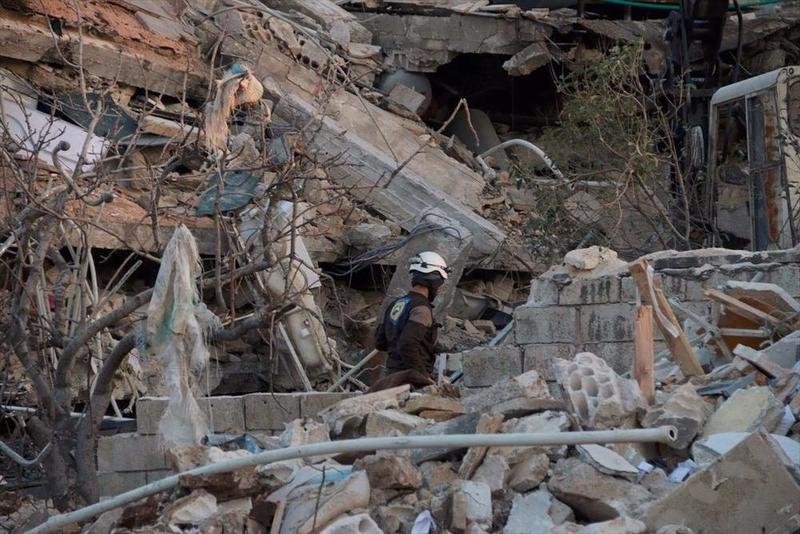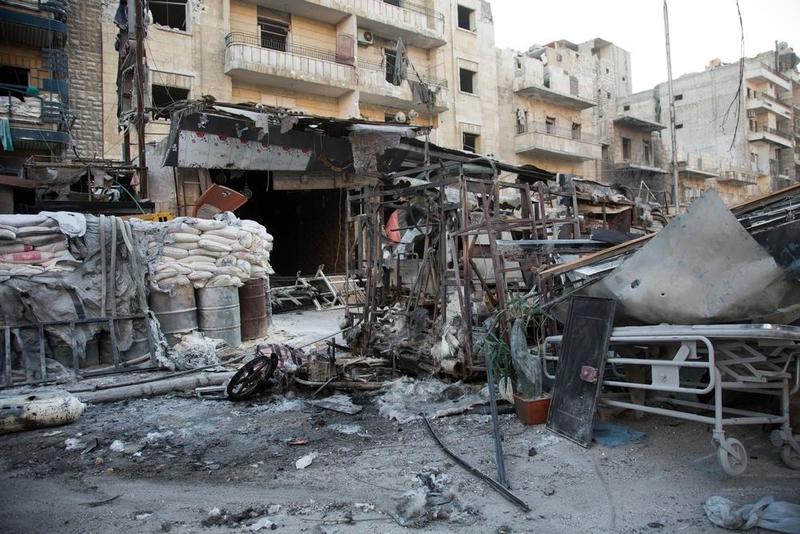The airstrikes came just minutes apart that morning, shattering a large, MSF-supported hospital in Syria’s Idlib province.
Twenty-five people were killed, including five children. Among the adult fatalities were a doctor, a chief nurse, five nurses and a lab technician. The raids were carried out by forces loyal to the Syrian government.
“Some of the victims were patients lying in their hospital beds,” recalls Dr Mazen. “Others were visiting their relatives.”
The 55-year-old orthopaedic surgeon worked at the hospital until it was crushed by a string of consecutive strikes — known as “double tap” in army-speak — on 15 February 2016.
“Our hospital was reduced to rubble, and so was my heart,” he says of the MSF-supported facility.

He thinks back to the attack every day. “The only reason I survived was because I was 15 minutes late to work. I should have been there at 9:00 am. The first strike came at 9:02 am. Rescue teams started to move in to try to pull survivors out from under the rubble. But the next strike came at 9:05 am. And then again at 9:45 am and 9:50 am.”
As all hell broke loose, the surgeon rushed alongside volunteer rescuers to evacuate survivors to the nearest medical facility — the Central Hospital in the northwest Syrian town of Maaret al-Numan.
But the nightmare was not over.
“Syrian air forces then fired two missiles at the Central Hospital, one at 11:00 am, the other at 11:05 am,” the surgeon recalls.
"The most dangerous place"
Scores of hospitals and medical facilities have been damaged or destroyed since the outbreak of war in 2011, notably by air strikes.
This has left hundreds of thousands of people without access to adequate healthcare. Additionally, hundreds of doctors and other medical professionals have been killed. Many others have been detained and tortured, for daring to provide care to people in “enemy” territory.
Thousands of health workers have joined the human tide of refugees fleeing Syria in recent years, knowing that they might otherwise become the next targets. Some, however, have stayed behind, fearing that if they left too, injured or sick civilians still trapped in the country would have no chance at life.
“In Syria, the most dangerous places to be are hospitals or ambulances.”
Yet because of the staff shortages, doctors still working in Syria face an enormous workload.
“There are days when we have to treat more than 100 people at once,” says Dr Ahmad, another surgeon who works at an MSF-supported hospital near the town of Jisr al-Shughour, not far from the Turkish border. “We see patients lying on the floor screaming in pain, but we just can’t get to everyone fast enough. “We have faced incredibly difficult days.”
He describes artillery attacks and air strikes on his facility.
“It is as though Syrian air forces and those of its allies are seeking to maximise the number of civilian casualties,” he says. “This is clear when markets, bakeries, town squares and hospitals are hit. In Syria, the most dangerous places to be are hospitals or ambulances.”
"Any building that looks like a hospital will be targeted"
Under international humanitarian law, hospitals and ambulances enjoy a special protected status.
In Syria, however, health workers have had to go to great lengths in order to conceal their ambulances and medical facilities — because they know that they are prime targets for attack should they be clearly marked.
“We hide our hospitals and cover our ambulances with mud in order to disguise them,” says Dr Ahmad, who is a general surgeon trained in Aleppo University.
Hospitals and medical centres are often concealed as their staff seeks to evade attack.
“The building housing this hospital used to be a cheese factory, but we turned it into a fully functioning hospital,” he continues. “Working conditions are not ideal but we are trying our best.”
Others have set up medical facilities in abandoned poultry farms or empty school buildings.
[[Article-CTA]]
“We doctors have learned that we cannot work in clearly marked, normal hospital buildings in Syria any more,” says Dr Ahmad.
“It’s just too dangerous. Any building that looks like a hospital will be targeted. Of course, this means that our patients aren’t getting the quality care they need, because these buildings were not designed to be hospitals. We also lack a lot of essential equipment.”
Still, many of Dr Ahmad ’s patients would simply not survive if they had to wait to be transported across the frontier to Turkey.
The border is mainly closed, and for some — particularly those with war injuries — the journey would just be too long.
Despite the grim working conditions he and his colleagues face, Dr Ahmad believes he must remain in Syria.
“We will never leave,” he says.
Moving hospitals, panic rooms
Dr Abdallah, a laboratory physician, explained that while he has continued to work in Syria, his wife, young daughter and two sons were now living in the Turkish border city of Gaziantep, where they can be safe.
“But because they worry about me, they live in constant fear and anxiety,” he says. “They know that being a medic in Syria is near-suicidal.”
He adds that it hasn’t always been easy to explain to his family why it is important for him to remain — particularly because their concerns are by no means unwarranted.
Dr Abdallah, who ran an MSF-supported hospital named after the Iraqi capital Baghdad, has also had a very close brush with death.
“Our hospital was bombed on 3 November,” he says. “Our logistician, named Emad Zeitoun, was killed when he went out of the panic room.”

He describes a makeshift 15 square metre shelter set up in the basement of the hospital, where medical staff and patients hid in during attacks.
The raid came at 11:00 pm, Dr Abdallah said, the same day as two other hospitals in Aleppo countryside were hit. “It was a black day for healthcare in Aleppo,” he says.
The facility had a huge workload when it was hit, mainly caring for bombing victims who needed amputations or other treatment for critical injuries. In fact, staff had so much to do that they were regularly forced to refer non-emergency cases to centres nearer the Turkish border.
Strike after strike
As a safety procedure, staff had covered the building housing the hospital with a two-metre-high dirt barrier. They also ensured no one ever filmed the facility, so that its exact location could not be discovered.
Nonetheless, it too came under attack.
First one strike, and minutes later, another.
“Those who could walk were sent away straight after the first raid; we knew another strike was imminent,” says Dr Abdallajh. “The others were packed into the panic room.
“Three floors were immediately crushed, one on top of the other, like a layered pastry cake."
“There were 50 of us in there when the second rocket hit 10 minutes later. Three floors were immediately crushed, one on top of the other, like a layered pastry cake. The strikes also left a hole in the ceiling of our shelter; everyone climbed out through there.”
Even after surviving his hospital’s destruction, the doctor is now looking for a new location to start working again.
“We will not stop fulfilling our humanitarian duty,” he says. “We as Syrian doctors cannot give up on our people. I don’t blame anyone who left, either to work on the Turkish border or in Europe. But if we all went away, who would help those left behind, and who have no one to turn to?”
Near daily attacks
Syria’s war has killed hundreds of thousands of people. Numerous UN resolutions have been issued condemning attacks on hospitals in Syria — yet attacks on medical facilities have either been denied outright or at best branded as mistakes.
For medical staff on the ground, all difficulties pale in comparison to the constant danger posed by air strikes and other violence.
Medical staff in MSF-supported hospitals in Idlib province reported 54 attacks on healthcare staff and facilities in the past six months.
Dr Abdel, a surgeon who now heads the opposition’s health directorate in Idlib province, agreed with his colleagues in that staff and equipment shortages make work very hard. Safety from air strikes and other attacks, however, is what Syrian doctors need the most.
“If we need insulin we can get it from NGOs like MSF,” said Dr Abdel. “But who can protect us?”





